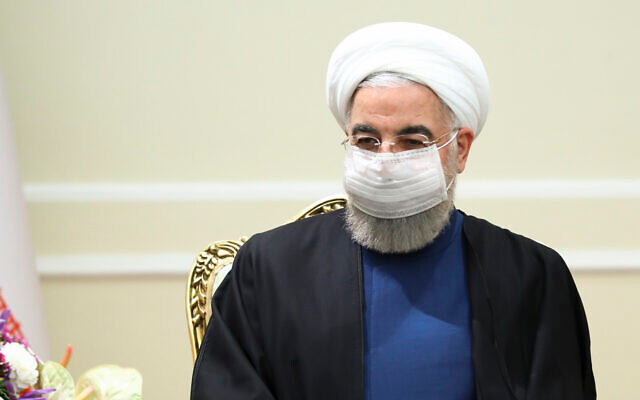Iranian envoy to UN atomic agency says Islamic Republic will start enriching at previously unseen levels by next week
Iran’s President Hassan Rouhani said Wednesday that Tehran’s decision to boost uranium enrichment to 60 percent was a response to Israel’s “nuclear terrorism,” three days after an attack on its Natanz nuclear facility.
“Enabling IR-6 [centrifuges] at Natanz today, or bringing enrichment to 60 percent: this is the response to your malice,” Rouhani said in televised remarks. “What you did was nuclear terrorism. What we do is legal.”
Israel, which hasn’t commented on the attack, is suspected of carrying out the weekend’s assault at the nuclear facility, part of an escalating shadow war between the two countries.
Speaking to his cabinet Wednesday morning, an impassioned Rouhani said damaged first-generation IR-1 centrifuges at Natanz would be replaced by advanced IR-6 centrifuges that enrich uranium much faster.
“You wanted to make our hands empty during the talks but our hands are full,” Rouhani said.
He added: “We cut both of your hands, one with IR-6 centrifuges and another one with 60%.”
Despite the Iranian announcement that it will begin enriching at 60% by next week, an Israeli TV report on Tuesday said that Iran will only be able to enrich very small quantities at that level since Natanz is still out of commission following the Sunday attack.
Channel 13 analyst Alon Ben David said that despite Iranian officials’ vow to begin the higher enrichment process, they cannot do it at Natanz, since the 6,000 centrifuges there remain inoperable. There are 1,000 centrifuges at Iran’s Fordo nuclear facility that can enrich to 60% in very small quantities, which did not appear to constitute a significant threat, the Israeli analyst said.
A senior Iranian official confirmed Tuesday that the blast at the Natanz nuclear facility destroyed or damaged thousands of centrifuges used to enrich uranium. Alireza Zakani, the hardline head of the Iranian parliament’s research center, referred to “several thousand centrifuges damaged and destroyed” in a state TV interview. However, no other official has offered that figure and no images of the aftermath have been released.
Rouhani’s comments come as Iran said it would start enriching at the new, previously unseen levels by next week in response to the attack.
“Modification of the process just started and we expect to accumulate the product next week” from centrifuges at Natanz, tweeted Iran’s envoy to the International Atomic Energy Agency, Kazem Gharibabadi.
The 60% step will bring Iran closer to the 90 percent purity threshold for military use and shorten its potential “breakout time” to build an atomic bomb.
The escalation in enrichment could see further retaliation as Prime Minister Benjamin Netanyahu has vowed never to allow Tehran to obtain a nuclear weapon.
Iran has threatened Israel over the strike, and an Israeli-owned ship was attacked in the Gulf of Oman Tuesday, the latest incident in the maritime tension between Tehran and Jerusalem.
In addition to increasing enrichment levels, Iran has said that authorities would install another 1,000 advanced centrifuges at Natanz. IR-6s enrich uranium far faster than its IR-1 first-generation centrifuges.
The incident at Natanz was initially described only as a blackout in the electrical grid feeding above-ground workshops and underground enrichment halls, but later Iranian officials began referring to it as an attack, and an Iranian official on Monday specified that it was a blast that knocked out the plant’s primary and backup power. The New York Times reported that the blast was caused by a bomb that was smuggled into the plant and then detonated remotely.
Iran’s Foreign Ministry said it damaged some of Iran’s first-generation IR-1 centrifuges, the workhorse of its nuclear program. Unsourced Israeli media reports have claimed that the entire plant, with some 6,000 centrifuges, remains out of action, and that various kinds of centrifuges, included advanced ones, were damaged.
Enrichment to 60% marks a significant escalation and is a short technical step away from weapons-grade uranium. Iran had been enriching up to 20%, and even that was a short step from weapons-grade levels of 90%.
The Biden administration has repeatedly said it will return to the 2015 nuclear deal if Iran first returns to compliance. Iran has taken a hardline approach, demanding the US lift all sanctions against it first, putting the two sides at a stalemate.
Israeli officials, including Netanyahu, have adamantly opposed the US returning to the nuclear deal, putting Jerusalem at odds with the new White House administration.
US and Israeli security officials held a bilateral strategic group meeting aimed at collaborating in the effort to prevent Iran from obtaining a nuclear weapon on Tuesday. The US stressed its commitment to preventing a nuclear-armed Iran during the virtual discussion and invited Israeli National Security Adviser Meir Ben-Shabbat to visit Washington in the coming weeks.
 Eurasia Press & News
Eurasia Press & News



